

Jesús Rodríguez sits in the recovery area after receiving the first dose of the coronavirus vaccine at a COVID-19 vaccination site at the Corsi Houses, Friday, January 15, 2021, in the East Harlem neighborhood of New York. (AP Photo/Mary Altaffer)
By Rogelio Sáenz, Adolph Delgado and Joshua A. Reyna
The pandemic has altered the U.S. Latino population in so many ways, causing much devastation and taking so many Latino lives over the last year and a half. Three months ago, the country surpassed over 100,000 Latino COVID-19 deaths. More recently, a survey conducted by the Pew Research Center noted the many ways the pandemic has brought havoc to Latinos with half of their respondents reporting that a family member or close friend had been hospitalized or died from COVID-19. Another recent report by researchers at the National Center for Health Statistics observed that the life expectancy of Latinos dropped by three years between 2019 and 2020, predominantly due to the large number of COVID-19 deaths.
As the vaccine became available, there has been much concern over the disproportionate underrepresentation of Latinos and African Americans among the vaccinated. Certainly, the same confluence of factors that put Latinos at risk of contracting the virus and succumbing to COVID-19 has also increased the difficulty in Latinos being vaccinated.
Nonetheless, despite much darkness and gloom regarding the massive loss of Latino lives and the recent surge of the Delta variant, there is a ray of hope. We have been tracking COVID-19 fatalities among Latinos and have been quite attentive to trends over the last seven months as the vaccine has become increasingly available.
Over the weeks of 2021, we have seen week-to-week declines in Latino COVID-19 deaths in 26 of the 27 weeks, with the exception being during the weeks between March 28 to April 3 and April to April 10. In fact, during the last week for which data are available —July 11 to July 17— there were a total of 60 Latinos who lost their lives to COVID-19 throughout the nation, the only week that there have been fewer than 100 fatalities in 2021. To put in perspective the decline of deaths over the weeks of 2021, in the first week of January 2021, there were 4,826 Latinos nationwide who died due to COVID-19—more than 80 times the number who died in the week of July 11 to July 17.
Furthermore, we must go back to the early weeks of the pandemic to find fewer Latino fatalities. In the week of March 8 to 14, 2020, there were three Latino COVID-19 deaths recorded. The weekly numbers surged after that week, rising to 69 the following week, to 476 the week afterward, with the peak of 4,826 occurring in the first week of January 2021 (January 3 to January 9).
What accounts for such a major decline in COVID-19 mortality in light of reports that keep showing that Latinos are disproportionately underrepresented among people being vaccinated?
One possibility has to do with the age structure of the Latino population. Latinos are a youthful population with nearly one-third of the population being less than 18 years of age and persons 65 and older accounting for 7 percent of the population. In contrast, more than one-fifth of whites are 65 and older, and this older segment of the population outnumbers persons less than 18 years of age.
Among age categories, persons 65 and older had the highest priority for getting vaccinated, putting Latinos way behind the vaccination line. Subsequent priorities turned to persons 18 and older and, more recently, individuals 12 to 17 years of age. Oftentimes, the percentage share of persons who have received one or two doses of the vaccine is compared to the percentage share of the total population. CDC data indicate that as of July 19, 2021, Latinos accounted for 16 percent of persons who have received at least one dose.
Latinos account for 18.4 percent of all persons in the U.S., but 16.4 percent of those 18 and older and 17.2 percent of persons 12 and older. As such, while Latinos are a bit underrepresented in getting vaccinated, the differences are not overly wide. In addition, there is evidence that Latinos have high rates of vaccination in areas where they have sustained significant loss of life due to the pandemic, such as Texas border counties. Furthermore, CDC data show that Latinos actually account for 30 percent of individuals who have initiated vaccination in the past 14 days. Plus, the percentage distribution of vaccines is based on the 58 percent of persons for whom race and ethnicity information is available.
Still, Latinos have also fallen for misinformation and lies in social media and other sources promoted by some segments of the Republican Party and Trump supporters discouraging people from getting vaccinated. The facts are clear and show that the vaccination is protecting people from contracting the virus, including the Delta variant, and even the small number who contract it experience only mild symptoms that largely do not require hospitalization. In fact, almost all of people hospitalized and dying from COVID-19 or the Delta variant are people who have not been vaccinated. For example, in Texas, the Texas Tribune recently reported that of the nearly 8,787 Texans who died from COVID-19 since February, 43 were with 8,744 not vaccinated. Put simply, more than 99 of every 100 COVID-19 fatalities were persons who were not vaccinated.
Despite this much-needed piece of promising news, we must understand that we are still very much in an ongoing pandemic that has brought multiple surges of deaths. There continues to be a significant hardcore group of individuals —among them, persons from our own Latino community— who are set on not getting vaccinated. As long as people refuse to get vaccinated, they will help sustain the coronavirus and its variants, to contract it, and spread it to their loved ones and people that they come into contact, who, in turn, will require hospitalization, ventilators, and ultimately lose their lives to this wicked disease.
The science and facts are clear: the vaccine is very highly effective and has very successfully protected those vaccinated from contracting the virus and succumbing to the disease. In the meantime, we need to continue to protect ourselves by continuing to use masks in public, avoiding large groups, getting tested if one feels ill, and self-quarantining if we get COVID-19. Finally, it is essential that we protect our children less than 12 years of age who are still ineligible for the vaccination. Come the fall semester, we need to make sure our children use masks as they return to school, despite governors in many parts of the country who are not mandating the use of masks in schools.
***
Rogelio Sáenz is professor in the Department of Demography at the University of Texas at San Antonio. He is a regular contributor to Latino Rebels.
Adolph “AJ” Delgado is a doctoral student in Applied Demography at the University of Texas at San Antonio. He is an applied methodologist working on several research projects surrounding HIV among Latino men who have sex with men and investigates syndemics and health disparities that impact Latinos.
Joshua A. Reyna is a doctoral student in the Department of Demography at the University of Texas at San Antonio.
This is AJ’s and Joshua’s first contribution to Latino Rebels.



